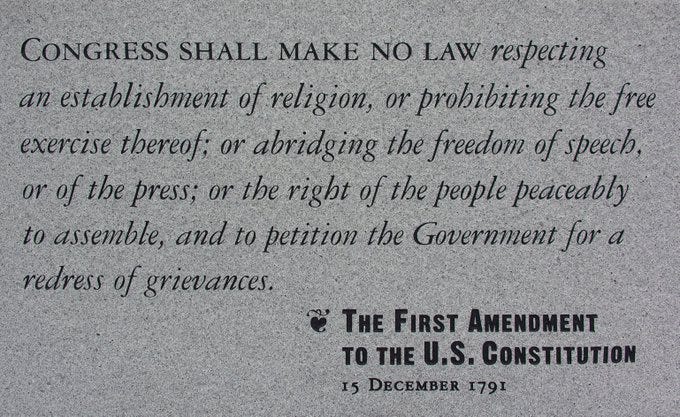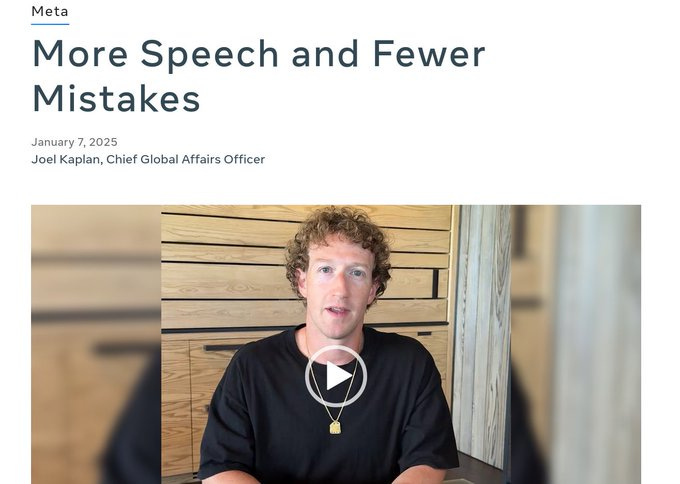Ending Federal Censorship in the US: President's Executive Order, the Twitter Files, and USAID
How are they connected? A dive into past US government censorship and the restoration of free speech.
On 20 January, the newly elected president officially confirmed that the US government has a history of trampling on free speech rights by censoring Americans' speech on online platforms.
It has often done so by exerting significant coercive pressure on third parties, such as social media companies, to moderate, de-platform or otherwise suppress speech that the federal government does not approve of. Such behaviour is a clear violation of the First Amendment.
Federal censorship in the US
This is a direct reference to many of the cases that occurred during Covid-19, particularly the systematic censorship referred to in the Missouri vs Biden lawsuit, in which US states, scientists and doctors sued the government. Stanford University medical professor Jay Bhattacharya, then Harvard Medical School professor Martin Kulldorff and psychiatrist Aaron Kheriaty asserted they were victims of systematic social media censorship orchestrated by the US government and implemented by social media companies. Here is Dr. Kheriaty explaining the situation:
Many examples of censorship (including criticism of the Covid measures and the suppression of the Hunter Biden laptop case) were cited in this comprehensive complaint. US government officials used Google, Facebook, Twitter and other social media platforms to suppress views, information and arguments that were inconvenient from a power perspective. Dr Jayanta Bhattacharya shares his experience of being a victim of censorship on social media:
The same censorship regime has been exposed on a massive scale in the so-called Twitter files. Matt Taibbi and others discovered a regular and organised stream of communication between the FBI, the Department of Homeland Security and the largest US tech companies. They had an organised system for flagging and censoring content by the tech companies, such as Twitter. Matt Taibi and Michael Schellenberger also testified to Congress regarding the Twitter Files.
Also, e.g. former FDA chief Scott Gottlieb, who joined Pfizer's management team in June 2019, had a direct line to Twitter through a similar model of "countering false information".
Twitter also used shadow banning as a tactic to block the circulation of posts by popular users who were critical towards government or its policies. This “black list” included e.g. Dr Bhattacharya, a US political commentator from the republican side, Dan Bongino, a conservative activist and radio host Charlie Kirk, etc. Censorship on the former Twitter was systematic and large-scale, a clearly chosen strategy to silence dissident voices on the platform (video credit: Project Veritas).
Apart from such systematic censorship, the US administration was wrong about most of the Covid-19 measures and coercive mandates. It was considered by several experts (e.g. Dr Jayanta Bhattacharya, Dr Marty Makary, Dr Vinjay Prasad etc) to be the main source of disinformation against its citizens.
Zuckerberg regretted censorship on Facebook
On 27 August 2024, Mark Zuckerberg admitted in a formal letter to Congress that the US government pressured social media platforms to implement censorship during Covid-19, and he regretted it. The censorship even included humour and satire.
In January 2025, Zuckerberg repeated these claims on Joe Rogan's podcast, explaining that this kind of pressure was at its most extreme during the Biden administration, when they were starting to roll out the vaccines: "They pushed us super hard to take down things that were honestly true." "Anything that says vaccines have side effects, you basically have to take it down."
So there is no question that the previous US administration imposed censorship on people by pressuring big tech companies and calling it "fighting disinformation".
Therefore, President Trump's executive order on free speech also mentions that censorship was enforced under the guise of fighting false information (misinformation, disinformation and malinformation). Indeed, this is the justification used in many parts of the world, including the EU.
Fact-checkers
Much of the labelling of speech as misinformation and disinformation is based on the work of so-called "fact-checkers", whose number has grown from 11 organisations in 2008 to a staggering 450 by 2024. They have created a smokescreen to justify censorship and make it look legitimate. Facebook has for years used the "services" of fact-checkers to justify censoring (closing accounts, limiting reach, shadow banning, etc.) views that differ from the official narrative, be it on medicine, Covid, immigration, etc.
Just last month, Zuckerberg announced that fact-checkers would be phased out on Facebook, at least in the US. According to Zuckerberg, in addition to ending cooperation with fact-checkers, Meta is also reducing restrictions on its platforms on a range of topics, including gender issues and how users handle immigration. Explaining his decision, Zuckerberg said that Meta started fact-checking in 2016 with the aim of being more inclusive, but that it has increasingly been used to shut down opinions. Zuckerberg acknowledged that the attempt to remove misinformation had gone too far and ‘reached a point where it’s just too many mistakes and too much censorship’.
Fact-checking organisations have been set up by several major mainstream media companies and have been funded by various actors. It turns out that USAID has also been busy offering its financial support to various fact-checkers and news outlets around the world.
Moreover, USAID has been partisan, advocating censorship through "countering disinformation" (especially since 2016) and social media "moderation" measures in its work. For example, USAID's 97-page "Disinformation Primer" (2021) advocates private sector censorship and proposes new techniques to control information. The agency endorsed "advertiser outreach" to financially strangle disfavoured media sources and social media accounts. USAID recommended Google's Redirect Method and "prebunking" to counter alternative narratives.
It has also funded large-scale training programmes to identify and combat disinformation on social media, such as this one explained by Mike Benz on Joe Rogan’s podcast:
In conclusion, in recent years we have witnessed a systematic effort, which began already before Covid-19, to restrict and censor dissident views from those of the power lines in the name of combating "disinformation". It is clearly high time for this to stop.
And as a final note, you might enjoy comedian Jamie Wolf who found out that an unemployed DNC misinformation official came to his show:











Let's see it now for the coercion and lies that have been told over net zero.